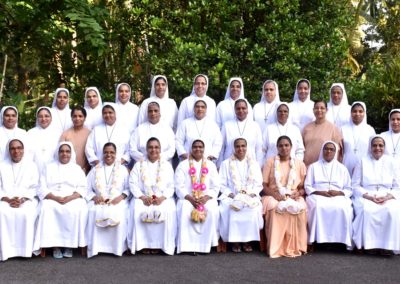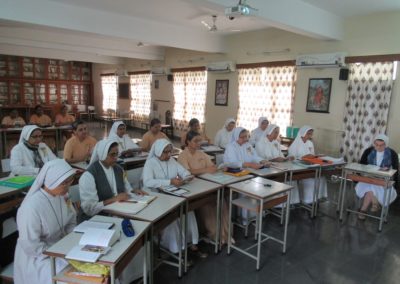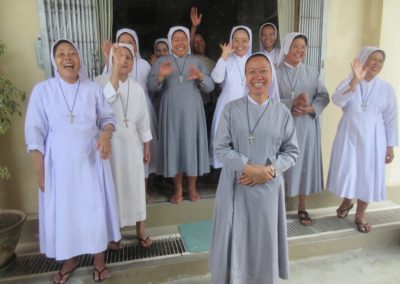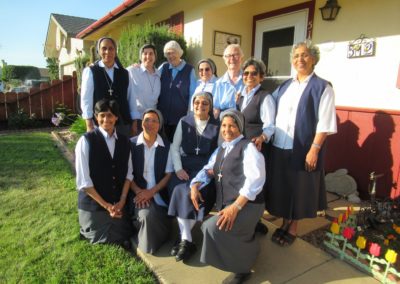“Promemoria” – 26 April 1831
This is the document into which Bartolomea wrote down and arranged, in various sittings from 26 April to 15 May 1831, the inspirations she had concerning the Institute: in moments of prayer, at Holy Communion or at work.
What emerges from it is a new light, a project of evangelical life founded on active charity and in self-offering, in ‘imitation’ of that of the Redeemer who “practised it in the course of his life”
This pattern of living in charity determines the apostolic nature of the Institute and moulds the spiritual experience of its members, training them in “doing everything possible, in suffering everything for the good of their neighbour” according to the traits of the heart of Christ: charity, gentleness and humility.
Abridged text.
(For full italian text see in pdf).
I write under obedience
After receiving holy communion, I think, I had this thought: The Institute which will be founded in Lovere is to be totally founded on charity and this must be its principal aim. This Institute in particular must be of assistance to young women in moral danger, excluding none of them, regardless of their age, social status or character, as long as they are in spiritual or material need and the Institute is able to do any good to them. The Institute must offer its assistance in every possible way to this kind of young people, because there are few means of bringing them back to the good other than by keeping them away from dangers.
Another time, I think during Prayer, I had this thought: The Institute is not only to be founded on charity, which will constitute its active life, but the contemplative life must also be added to it so that those who consecrate themselves to this Institute may live both forms of life; which means, that in this Institute a good part of the day must be devoted to Prayer especially to holy meditation so that, all their works of charity may produce good fruit because they are an outcome of Prayer and that those persons may be able to teach others what they have learnt from God in prayer.
Another time, while I was at work, I had the following thought which was later confirmed during several Communions and prayers: The Institute must be founded on the principles and examples left us by our Lord Jesus Christ, so that its rule may be a copy of his actions. So all the rules, prescriptions and regulations are to be directed to the imitation of what Jesus Christ did in this World and He must be our protector, norm and guide.
Just as many Institutes propose either the veneration of the Blessed Virgin Mary or the imitation of a particular saint, so this Institute should propose to itself to honour the Redeemer and imitate his examples, so that a person who consecrates herself to it may become a true daughter of Jesus Christ through her imitation of Him.
This idea of the imitation of the Redeemer etc. became clear to me in a way I am unable to explain, and the rules appropriate to reach this goal, appeared beautiful and sweet to me, although I could not see them clearly… But every time this thought returned to me it left a great sweetness in my heart, and, at times, a sense of gratitude as well, in knowing that Jesus Christ would grant us a wonderful grace if he would call us to such heights.
Once again at holy Communion, I felt that the Institute should have as its main aim the education of poor young girls without parents, keeping them even by providing for their full support, until they grow up and learn some work by which to earn an honest living.
Furthermore, it seems to me that it would be very pleasing to our Lord if, besides the day-school conducted free of charge for the poor, the Institute could provide a boarding school as well for all those girls, either coming from the place or from elsewhere, who desire to be educated there, and that especially if they have the intention of becoming school teachers or if they are good natured, thus giving hopes of lending themselves for the service of the neighbour.
More than once I felt in my heart that the persons who consecrate themselves to this Institute are to be endowed with an extremely solid piety, with outstanding virtue and a natural disposition to love young people. Therefore great caution should be used in accepting a candidate: her virtue and vocation are to be carefully tested because, this being a “free” Institute, there would be the grave risk of extremely damaging consequences. It seems to me that our Lord wishes for these persons a very strict and rigorous novitiate, during which the observance of the rules must be inculcated in them and the importance of the commitment to be assumed clearly understood by them; they must feel the need of a great trust in God and of a true spirit of charity, motivated by a genuine purity of intention, through which everything becomes easy and pleasant. It would be good, at this stage, to make them aware of all these, so as to instil into them the true spirit required by the Institute. It seems to me that our Lord desires that none of them should be engaged in any kind of work or in external services of charity, during the time of the novitiate because the candidates should first learn the true spirit of the Institute and then put it into practice in every service that will be entrusted to them.
It seems to me that our Lord wishes that the Institute have the three vows of chastity, obedience and poverty common to other religious congregations.
Besides charity that must reach out to all young girls, be they poor, needy, rich or in whatever condition, it seems to me that it would be very pleasing to our Lord if the Institute should devote itself to the relief of the poor sick as well, and especially to the care and the direction of Hospitals, where the sisters will serve the sick, comfort them and provide them with spiritual and material help.
This must be a branch of the Institute, springing forth from that sincere charity which should be an ornament of those who consecrate themselves to this kind of life, very similar to that of our most lovable Redeemer.
The members of this pious Institute ought to be endowed with every virtue, but their characteristic virtues should be charity, gentleness and humility, in imitation of our most lovable Redeemer who seemed even to glory in them.
And it seems to me that our Lord demands that these virtues be practised so perfectly by them so as to truly shape their character in such a way that everyone, just looking at them, or dealing with them, will recognize them as true followers of the Redeemer.
Although this Institute should be a simple “Retreat”, yet it seems to me that our Lord desires in it the greatest charity among the Individuals, a perfect community with total equality among all, without any partiality whatsoever, neither for the rich, nor for the frail nor for any other human consideration. From the time of joining the Institute, everyone should be a perfect Sister to the poor Daughters of this Institute. The true demands of illness will be the only reason to dispense the Sisters from this universal community.
Furthermore it seems to me that God wants this pious Institute to help those poor candidates who would be suited for its purpose and yet for lack of means they cannot have the consolation they desire. Let the way be left open for them and let the Institute receive them, trusting in that unfailing Providence of God which never fails those who trust in it.. And it seems to me that God wants it precisely in order to be consistent with the end which the Institute must have, of imitating our most Holy Redeemer. In fact, He required such a detachment from them that He said to those who followed Him that He himself had neither a house nor a shelter.
Last Friday, when receiving Holy Communion, I felt in my Heart more clearly than at other times, and with special tenderness, that the Institute to be founded here shortly should really be called the Institute of the Redeemer and those persons who consecrate themselves to it the Daughters of the Redeemer. It seems to me that God wishes it to be called by this particular name both to indicate the predilection which He will have towards this pious Retreat and to teach those who consecrate themselves to it, the way to holiness; God has reserved such a great and charitable enterprise for these times, when the need is great and extreme.
The novitiate might well represent the hidden life of Jesus Christ and it seems to me that He wants it to last a long time, at least for two and a half years. The life that follows it should be wholly engaged for the good of the neighbour, without exceptions, and could be in some way, an imitation of the active life of Jesus Christ during the three years of his preaching. The fourth vow of charity which it seems to me that the Lord requires of these persons, would bind them to do everything possible, suffer everything and even shed their Blood for the good of their neighbour. These could be considered as a distant imitation of the consuming love of our Redeemer in dying for us. Frequent prayer, and specially holy meditation for a considerable length of time everyday, could resemble the frequent periods of solitude that our lovable Redeemer spent apart from people to be with his Divine Father and to intercede for us all. The number of twelve Workers, excluding domestic helpers, who may perhaps be sufficient for this pious Work, could indicate the twelve Apostles whom He chose for the salvation of mankind; but since our Lord accepted disciples as well, this number could be increased if required by the circumstances.
May our most lovable Redeemer make us his true followers.
Amen
The challenges of our times which in their very contradictions hide a deep yearning for religiosity, together with the Church’s appeal to promote a spirituality of communion, induce us to live up to our charism by cultivating a timely dialogue of charity in our relations with those we meet and serve through the works of mercy in accordance with our apostolic project.
With this aim in mind, we draw on our womanly resources and on values of internationality and interculturality that characterize our Institute.
We live by this gift of communion first of all in our fraternal life as sisters who partake of the same founding charism and share spiritual and material goods, and as disciples of Jesus ever on our way together, sustained by merciful love for one another.
The increased internationality of the Institute is for us a source of richness impelling us to welcome and value cultural diversities and committing us to tackle calmly any limits or difficulties that dialogue involves.
Made capable, by grace, of reciprocity and communion among ourselves, we strive to carry on a dialogue of charity in our apostolic service: we do this by fostering a sense of universal brotherhood in Jesus the Redeemer, remaining in solidarity with the poor and going through a process of inculturation, without which we cannot be true neighbours today. This demands that we be discerning, willing to learn from what is different and to develop a readiness for collaboration in Church and in society, effecting an exchange of gifts that is typical of genuine service.
True to our identity as consecrated persons committed to follow Jesus the Redeemer, who for our sake took the “form of a servant” and wanted us all to be one in himself, we strive to promote a culture of solidarity and to foster a spirituality of communion in the ecclesial and human family, so that all may live as God’s children in the Father’s household.






